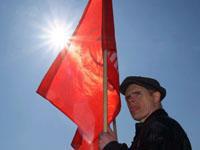Today's world would be unthinkable without Russian Revolution
The Day of the October Revolution, November 7, is still a public holiday in Belarus. In Russia, it stopped being one after the collapse of the Soviet Union. More precisely, before 7 November 2004, the day was marked in calendars as a Day of Accord and Reconciliation. But the surrogate did not live long.

For many people - especially of the older generation - November 7 is still a great holiday. The Communist Party of the Russian Federation celebrates the holiday every year. Although, it is definitely a big question, whether the current Communist Party, or rather, its leadership, has more reasons to celebrate the October Revolution, than, for example, the Liberal Democratic Party, or "United Russia" have.
On the official level, politicians do not try to talk much about the events in October 1917 as a revolution. They refer to those events as a coup. The concept of a new textbook on history no longer distinguishes between February and October revolutions. Experts preferred to call the events of 1917 the Great Russian Revolution.
In fact, maybe it is fair. Eventually, there would be no October Revolution without the February one. But one can hardly deny the fact that the October Revolution had a huge impact not only on the whole world, but also on Russia. Do we have to try to downplay the significance of the events of October 1917, and even more so - do we need to be ashamed of them?
"Of course, in a purely technical sense, November 7, 1917 was a coup. But that coup was a part of the grand revolutionary process, which began in February and continued for a whole historical period, before the revolutionary impulse got exhausted," political analyst Boris Kagarlitsky said.
"It's comparable to what happened in France in the 18th century. The Russian Revolution shook not only to Russia, but radically changed the whole world. And the world we see around us today, would be unthinkable without it, just like the world of the 19th century would be unthinkable without the French Revolution. This is a fact of history of Germany, England or the United States, just like the fact of history of our country," he stressed.
"What did it give us? It created the modern Russian nation, like the French revolution created the French nation in 1789. We would have been absolutely different people otherwise. We'd live in other places, have different composition of blood and speak a completely different language. The revolution made the Russian literary language the heritage of the entire nation and not only the Russian nation. The result was free education, health care, the widespread introduction of universal and equal election right, which did not exist in Russia and many countries of the West before 1917," the scientist of politics told Pravda.Ru.
"The Soviet Union could not build socialism in practice, although it was its proclamation ideologically. Capitalism radically changed under the impact of the Russian Revolution. Now, when we dismantle the structures generated by the revolutionary breakthrough, capitalism degrades as well. We say that there is "wild capitalism" in Russia. But the fact is that it has been "running wild" in the whole world. This will continue, until someone gives a new impetus to social change," said Boris Kagarlitsky.
"According to polls, about 58 percent of people positively estimate the October revolution; about 25 percent are negative to it," said political analyst Sergei Chernyakhovsky.
In his view, the October Revolution was "the union of the people in opposing the dysfunctional government."
"All that was declared back then - was the ideals of public self-government, the ideals of accelerated development, the ideals of participation of each and everyone in the government," said Sergey Chernyakhovsky.
"Anyway, the whole prosperous Western world now enjoys the results of the path, which the October Revolution opened," the analyst told Pravda.Ru.
As for modern followers of the Bolsheviks, both Boris Kagarlitsky and Sergei Chernyakhovsky believe that there is no reason to regard them as such.
"When it comes to the Communist Party, this party is like a collection of people, who irresponsibly squander the legacy of their famous ancestors. They use the name, but do not even understand the meaning of the words spoken. Of course, there are different people at the Communist Party, but its administration is fully engaged in its own business only," said Boris Kagarlitsky.
"As for other communist groups, they need to learn to talk about something else, other than class struggle. They need to learn to work in the interests of working people - through free trade unions, social movements, etc. This is less romantic than making speeches about revolution, but that's what creates credibility among the masses," he stressed.
In the opinion of Sergey Chernyakhovsky, modern Russian communists represent a kind of residual branch that does not carry the temperament of the transformation of the world."
"The Bolsheviks always focused on the connection of their strategic objectives with what people lived. They wanted to move forward through the implementation of demands and expectations of people. And now, unfortunately, communists - those who call themselves communists today - talk about the things that are interesting only to themselves, rather than to people. They protect the world of their words and the world of their values, but they do not know how to connect it with expectations of the society," said the analyst.
Oleg Artyukov
Pravda.Ru
Subscribe to Pravda.Ru Telegram channel, Facebook, RSS!


